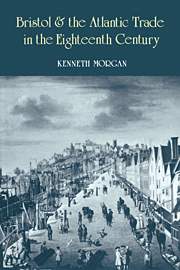Book contents
Conclusion
Published online by Cambridge University Press: 12 October 2009
Summary
During the Tudor and Stuart periods, Bristol was transformed from a medieval trading city to a centre of early modern capitalism. The quest for imports from the New World, the formation of business ties with overseas agents, and extensive use of credit all helped to open her economic gates and provide a platform for future commercial development. By 1700 she was already an Atlantic entrepôt whose international trade touched nearly every foreign market. Throughout the eighteenth century Bristol's Atlantic commerce grew significantly in absolute terms, her merchants responded to new commercial pressures and opportunities, and a great deal of local capital was poured into international trade and the industries connected with it. This created wealth in the Bristol merchant community and supported a wide range of artisan activities linked to the production and consumption of goods. Bristol, it should be remembered, was a leading centre of growth industries between 1660 and 1800: sugar refining, soap making, glass and pottery manufacture, and the metal industries all flourished in the city during that period. Moreover, Bristol's role as ‘metropolis of the west’ helped her to dominate the internal and external trade of the entire south-west region. With significant population growth as well as economic development, Bristol remained one of the five largest English cities between the late seventeenth and early nineteenth centuries, and the only one outside the metropolis to maintain this position. The other leading provincial capitals of the late Stuart era–York, Norwich, Exeter–failed to maintain similar demographic and economic growth by the Regency period.
- Type
- Chapter
- Information
- Bristol and the Atlantic Trade in the Eighteenth Century , pp. 219 - 224Publisher: Cambridge University PressPrint publication year: 1993



